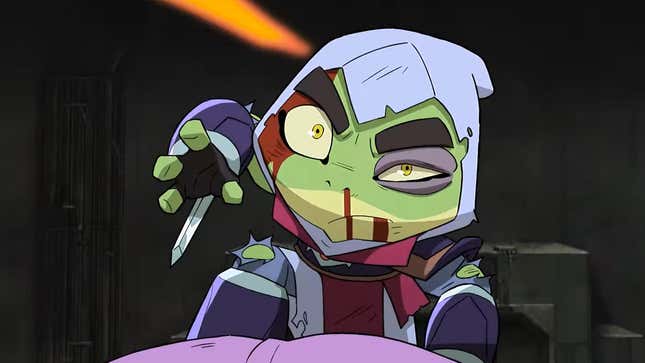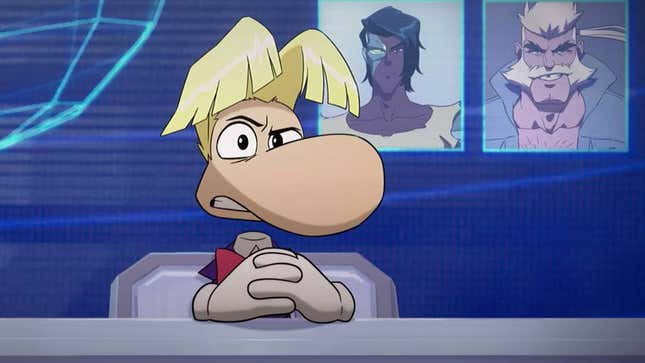These days, pretty much any video game is ripe to be adapted for a movie or TV show. But that didn’t make it any less odd when it was revealed Netflix was aiming to make a cartoon out of 2013’s Far Cry 3: Blood Dragon, a retrofuture parody of 80s action media. That fondly remembered standalone hangs over Ubisoft’s Far Cry franchise in an odd way, and it wasn’t entirely wrong to think that the newly released Captain Laserhawk: A Blood Dragon Remix was showing up very late to the party. Despite the initial strangeness, the finished product is a surprisingly fun good time, made all the more interesting by how much it’s committed to providing its own distinct, yet fairly familiar brand of goofiness.
Captain Laserhawk’s general pitch can best be described as “Ubisoft’s Suicide Squad, through the lens of old GI Joe cartoons.” The show is set in the alternate, distant future of 1992, where a megacorporation dubbed Eden has taken over what remains of the United States and turned it into a dystopian technocracy. Cyborg supersoldier Dolph Laserhawk (Nathaniel Curtis) is forced into a joining a black ops team alongside Jade (Courtney Mae-Briggs) and Pey’j (Glenn Wrage) from the cult classic game Beyond Good & Evil and a talking bullfrog (Yves Bigerel, aka “Balak,” the show’s creative director) who operates as the last member of the Assassins from Ubisoft’s long-running stealth series. With bombs in their heads that’ll detonate if they don’t comply, the foursome run ops for the prison’s warden, all while Dolph tries to reckon with being put n this situation because he was betrayed by his boyfriend Alex (Boris Hiestand) during a heist.
Advertisement

Advertisement
If that all sounds completely ridiculous, that’s because the show is exactly that. Whereas Castlevania’s shows feel methodically plotted and like they’re trying to capture the spirit of the games they borrow their name from, Laserhawk is more like an animation team that really likes Ubisoft games threw out a bunch of ideas on the fly and stitched together a unifying plot after the fact. The end result is a show where you’re never quite sure what’s going to happen next, mostly on a visual level: the primary animation aesthetic borrows from GI Joe with sometimes stilted movement and lip-syncing that feels a little bit off, but not so much that it takes away from the experience. But every now and then, animation studio Bobbypills throws a curveball—suddenly the show will change its animation style to mimic 2D sprites, or pixelated live-action—that ends up working much better than you’d expect.
Advertisement
Those who’ve played a number of Ubisoft franchises over the years will get a little something extra out of watching Laserhawk unite disparate characters and ideas from those properties into a single show. (With two gay men as the core relationship, it even manages to dip into toxic yaoi territory, made funnier by the fact that a yaoi manga of the two actually exists.) It lacks a general coherence, but it makes up for that with its energy: it’s admittedly delightful to watch a vanity project from one of the biggest third-party game publishers not work overtime to make every one of its franchises come off as the most important thing ever.
For better or worse, the show has a bit of a mean streak in how it regards some Ubisoft characters, such as reimagining Rayman (David Menken) as a delightfully unhinged, pathetic talk show host operating as a model minority working as Eden’s propaganda machine. At the same time, you can tell that Bobbypills, director Medhi Leffad, and creator Adi Shankar—who helped get Castlevania off the ground for Netflix—are having genuine fun with these properties and the odd premise they’ve cooked up. Even if you’re someone who’s long been sick of Assassin’s Creed nonsense or can’t find yourself to care about Watch Dogs or Splinter Cell anymore, this show provides some clever spins on characters (or themes) from those titles. Whether it’s watching Bullfrog recite the mantra of the Assassins before springing into action or the team’s Warden (Caroline Ward) gradually unveil her motivations, Captain Laserhawk manages to be genuinely engaging when it easily could’ve been self-congratulatory IP fare.
Advertisement

When the show is bouncing between different types of animation and letting its eclectic cast do their thing, the show is at its best. But when it’s not doing that, you can see some of its flaws stand out. The show doesn’t have as much time as it probably needs to really dig into the themes of resistance and destroying regimes, leaving that part of its story feeling unfinished so as for a hopeful season two tease. And much like how Castlevania: Nocturne could’ve benefited from another quartet of episodes, the same holds true here. Laserhawk makes the most out of its six-episode run, but certain characters and emotional beats feel like they would’ve benefitted from some more breathing room.
Advertisement
Captain Laserhawk is endearingly goofy and disposable, even as it tries to earnestly focus on what it looks like to rebel within a restrictive system and the lengths people go to to maintain their individual personhood. By no means is it revolutionary, but it won me over within minutes, and it was hard not to want a second season after how everything ended. In that sense, it really is like a Ubisoft game: you may not fully know what you’re getting into at first, but there’s eventually something that gets its hooks into you and keeps your attention.
The complete first season of Captain Laserhawk: A Blood Dragon Remix is streaming on Netflix.
Advertisement
Want more io9 news? Check out when to expect the latest Marvel, Star Wars, and Star Trek releases, what’s next for the DC Universe on film and TV, and everything you need to know about the future of Doctor Who.
Services Marketplace – Listings, Bookings & Reviews